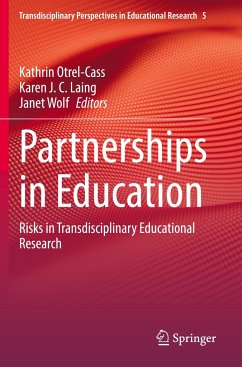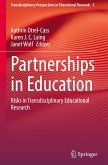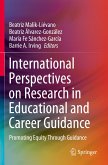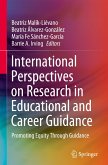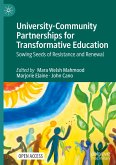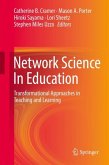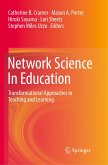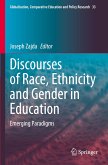Partnerships in Education
Risks in Transdisciplinary Educational Research
Herausgegeben:Otrel-Cass, Kathrin; Laing, Karen J. C.; Wolf, Janet
Partnerships in Education
Risks in Transdisciplinary Educational Research
Herausgegeben:Otrel-Cass, Kathrin; Laing, Karen J. C.; Wolf, Janet
- Broschiertes Buch
- Merkliste
- Auf die Merkliste
- Bewerten Bewerten
- Teilen
- Produkt teilen
- Produkterinnerung
- Produkterinnerung
This book contains a series of unique international contributions that explore risk in partnerships involving education. Presenting a range of theoretical, methodological and practical perspectives, the book discusses aspects such as the role of motivation, leadership, process and context in such partnerships and provides examples of research methods for examining them. It illuminates the different histories and disciplinary backgrounds of partners, showing that risk can reside in the different expectations, understandings and interpretations that each partner brings to educational…mehr
Andere Kunden interessierten sich auch für
![Partnerships in Education Partnerships in Education]() Partnerships in Education119,99 €
Partnerships in Education119,99 €![International Perspectives on Research in Educational and Career Guidance International Perspectives on Research in Educational and Career Guidance]() International Perspectives on Research in Educational and Career Guidance75,99 €
International Perspectives on Research in Educational and Career Guidance75,99 €![International Perspectives on Research in Educational and Career Guidance International Perspectives on Research in Educational and Career Guidance]() International Perspectives on Research in Educational and Career Guidance75,99 €
International Perspectives on Research in Educational and Career Guidance75,99 €![University-Community Partnerships for Transformative Education University-Community Partnerships for Transformative Education]() University-Community Partnerships for Transformative Education38,99 €
University-Community Partnerships for Transformative Education38,99 €![Network Science In Education Network Science In Education]() Network Science In Education67,99 €
Network Science In Education67,99 €![Network Science In Education Network Science In Education]() Network Science In Education67,99 €
Network Science In Education67,99 €![Discourses of Race, Ethnicity and Gender in Education Discourses of Race, Ethnicity and Gender in Education]() Discourses of Race, Ethnicity and Gender in Education104,99 €
Discourses of Race, Ethnicity and Gender in Education104,99 €-
-
-
This book contains a series of unique international contributions that explore risk in partnerships involving education. Presenting a range of theoretical, methodological and practical perspectives, the book discusses aspects such as the role of motivation, leadership, process and context in such partnerships and provides examples of research methods for examining them. It illuminates the different histories and disciplinary backgrounds of partners, showing that risk can reside in the different expectations, understandings and interpretations that each partner brings to educational partnerships. The eighteen chapters discuss critical examinations of educational partnerships from very different perspectives, including formal learning institutions and community partners, and include the voices from children, students, teachers and policy makers. The book provides insights for everyone who is considering the challenges that can arise in partnerships and will be useful for researchers at different levels and those who are planning to forge new partnerships or think about what may present itself to be a challenge, and how to address and overcome such challenges.
Produktdetails
- Produktdetails
- Transdisciplinary Perspectives in Educational Research 5
- Verlag: Springer / Springer International Publishing / Springer, Berlin
- Artikelnr. des Verlages: 978-3-030-98455-7
- 1st edition 2022
- Seitenzahl: 416
- Erscheinungstermin: 1. Juni 2023
- Englisch
- Abmessung: 235mm x 155mm x 23mm
- Gewicht: 628g
- ISBN-13: 9783030984557
- ISBN-10: 3030984559
- Artikelnr.: 67880237
- Herstellerkennzeichnung
- Springer-Verlag GmbH
- Tiergartenstr. 17
- 69121 Heidelberg
- ProductSafety@springernature.com
- Transdisciplinary Perspectives in Educational Research 5
- Verlag: Springer / Springer International Publishing / Springer, Berlin
- Artikelnr. des Verlages: 978-3-030-98455-7
- 1st edition 2022
- Seitenzahl: 416
- Erscheinungstermin: 1. Juni 2023
- Englisch
- Abmessung: 235mm x 155mm x 23mm
- Gewicht: 628g
- ISBN-13: 9783030984557
- ISBN-10: 3030984559
- Artikelnr.: 67880237
- Herstellerkennzeichnung
- Springer-Verlag GmbH
- Tiergartenstr. 17
- 69121 Heidelberg
- ProductSafety@springernature.com
Kathrin Otrel-Cass, Ph.D., is professor in teaching, learning and digital transformations at the University of Graz, Austria. Her research interests are often of interdisciplinary in nature with focus on digital visual anthropology and variety of qualitative, ethnographic methodologies. She works with various practitioners and experts in environments where people are working with science/technology/engineering practices or their knowledge products. Her research is often set in schools but is not exclusive to those environments. Her research interest in visual ethnography has led to the establishment of a video research laboratory in Graz with a focus on the organized analysis of video recorded data. Kathrin is a member of Network 15, partnerships in education of the European Education Research Association (EERA). Karen Laing is Co-Director of the Centre for Learning and Teaching and Senior Research Associate at Newcastle University, UK. She specialises in research about how societal structures, institutions and practices impact on vulnerable or disadvantaged children, young people, families and communities. Specific interests include: how different professionals work together to deliver services and opportunities for children (particularly involving schools); theory-based research approaches in project development and evaluation; and, participatory research methods. She has a keen interest in co-creation and the processes involved in stimulating change from research. She is an experienced researcher, having led over 40 research projects and collaborated on many more. Her work is guided by an overarching commitment to social justice and drawing on socio-cultural theory. Janet Wolf is an Assistant Professor in teacher training within the field of interdisciplinary subjects such as multicultural education, citizenship education etc. at Faculty of Education, University of Hradec Kralove, Czech Republic. Her research interests focus on second language learners and their inclusion in education. She is a member of various research groups involving experts from several countries. Janet is a member and reviewer of Network 15, partnership in education of the European Education Research Association (EERA).
Part I. Partnerships between groups who belong to formal educational institutions.- 1. On promises and perils: thinking about the risks and rewards of partnerships in education.- 2. School Development within Networks in a Digital World: Risky Ride or Beneficial Blessing?.- 3. Bhutanese partnerships between initial Teacher Training Colleges and Educational Stakeholders.- 4. Risks and Drivers of Success in Higher Education Partnerships in Conflict Contexts: A German-Iraqi Partnership in Times of Isolation and Displacement and First Steps Towards Recovery.- 5. Cosmopolitan or locals: deconstructing the patterns of co authorship of papers in higher education studies in Latin America.- 6. Risks in partnerships. Navigating through three unsuspected problems.- Part II. Partnerships in education and the risks emerging from relationships of difference.- 7. Working as co-actors, to reduce inequalities and prevent tensions in a partnership.- 8. School-University Partnership for School Development: Risks and Realities of a National Policy Initiative in Norway.- 9. Student-researcher partnerships: uneven realities.- 10. If you are my 'development partner', am I also yours? - A study of the risks of partnership between teacher education and school.- Part III. Enacting social justice in partnerships between educators and others.- 11. Partnership or Rivalry? Facing the Pandemic in Hungarian Education.- 12. The perception of not-for-profit organisations on risks in partnership with Czech, Sicilian and Castilian-Leonese schools.- 13. Partnerships between Schools and Civil Society Organizations - A look at their role for the Social Integration and Schooling of Newly Immigrated Children and Youth in Germany.- Part IV. Partnerships that bring together the knowledge and skills of educationalists with those of other sectors in enacting societal change that goes beyond educational systems.- 14. Coming to Terms with Feedback from Critical Friends: Reflections ofRisks in a Swedish Regional Collaboration Project.- 15. Partnership in Education and Formative Paths for Healthcare Professionals. The Risks, the Paradoxes and the Practice of Pretext.- 16. Risk in healthcare collaboration: applied interdisciplinary social science in clinical settings.- 17. Creating transformational change through partnership.- 18. Between Losing Ground and Getting Stuck? Social Movement Organisations Collective Strategising between Protest and Institutionalisation.
Part I. Partnerships between groups who belong to formal educational institutions.- 1. On promises and perils: thinking about the risks and rewards of partnerships in education.- 2. School Development within Networks in a Digital World: Risky Ride or Beneficial Blessing?.- 3. Bhutanese partnerships between initial Teacher Training Colleges and Educational Stakeholders.- 4. Risks and Drivers of Success in Higher Education Partnerships in Conflict Contexts: A German-Iraqi Partnership in Times of Isolation and Displacement and First Steps Towards Recovery.- 5. Cosmopolitan or locals: deconstructing the patterns of co authorship of papers in higher education studies in Latin America.- 6. Risks in partnerships. Navigating through three unsuspected problems.- Part II. Partnerships in education and the risks emerging from relationships of difference.- 7. Working as co-actors, to reduce inequalities and prevent tensions in a partnership.- 8. School-University Partnership for School Development: Risks and Realities of a National Policy Initiative in Norway.- 9. Student-researcher partnerships: uneven realities.- 10. If you are my 'development partner', am I also yours? - A study of the risks of partnership between teacher education and school.- Part III. Enacting social justice in partnerships between educators and others.- 11. Partnership or Rivalry? Facing the Pandemic in Hungarian Education.- 12. The perception of not-for-profit organisations on risks in partnership with Czech, Sicilian and Castilian-Leonese schools.- 13. Partnerships between Schools and Civil Society Organizations - A look at their role for the Social Integration and Schooling of Newly Immigrated Children and Youth in Germany.- Part IV. Partnerships that bring together the knowledge and skills of educationalists with those of other sectors in enacting societal change that goes beyond educational systems.- 14. Coming to Terms with Feedback from Critical Friends: Reflections ofRisks in a Swedish Regional Collaboration Project.- 15. Partnership in Education and Formative Paths for Healthcare Professionals. The Risks, the Paradoxes and the Practice of Pretext.- 16. Risk in healthcare collaboration: applied interdisciplinary social science in clinical settings.- 17. Creating transformational change through partnership.- 18. Between Losing Ground and Getting Stuck? Social Movement Organisations Collective Strategising between Protest and Institutionalisation.

